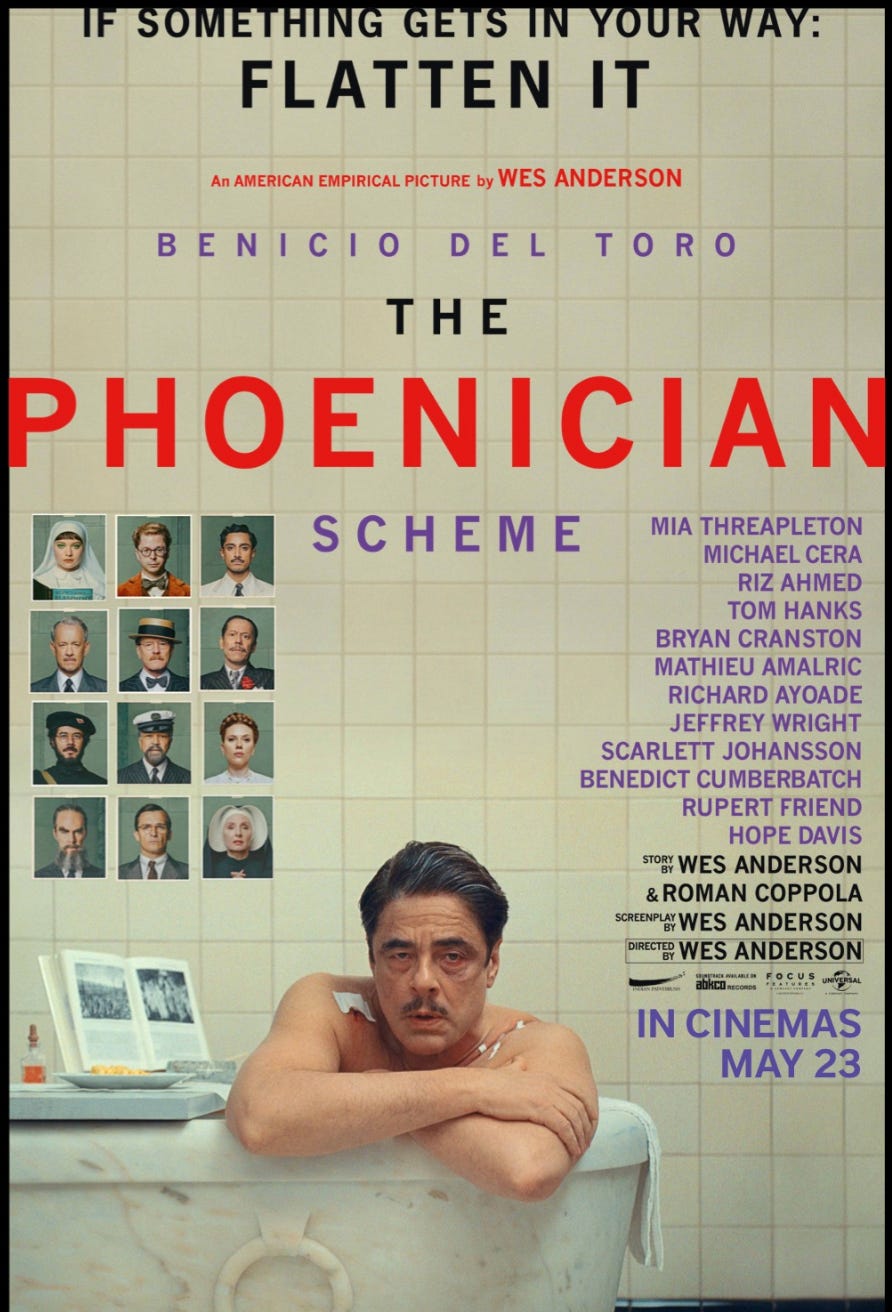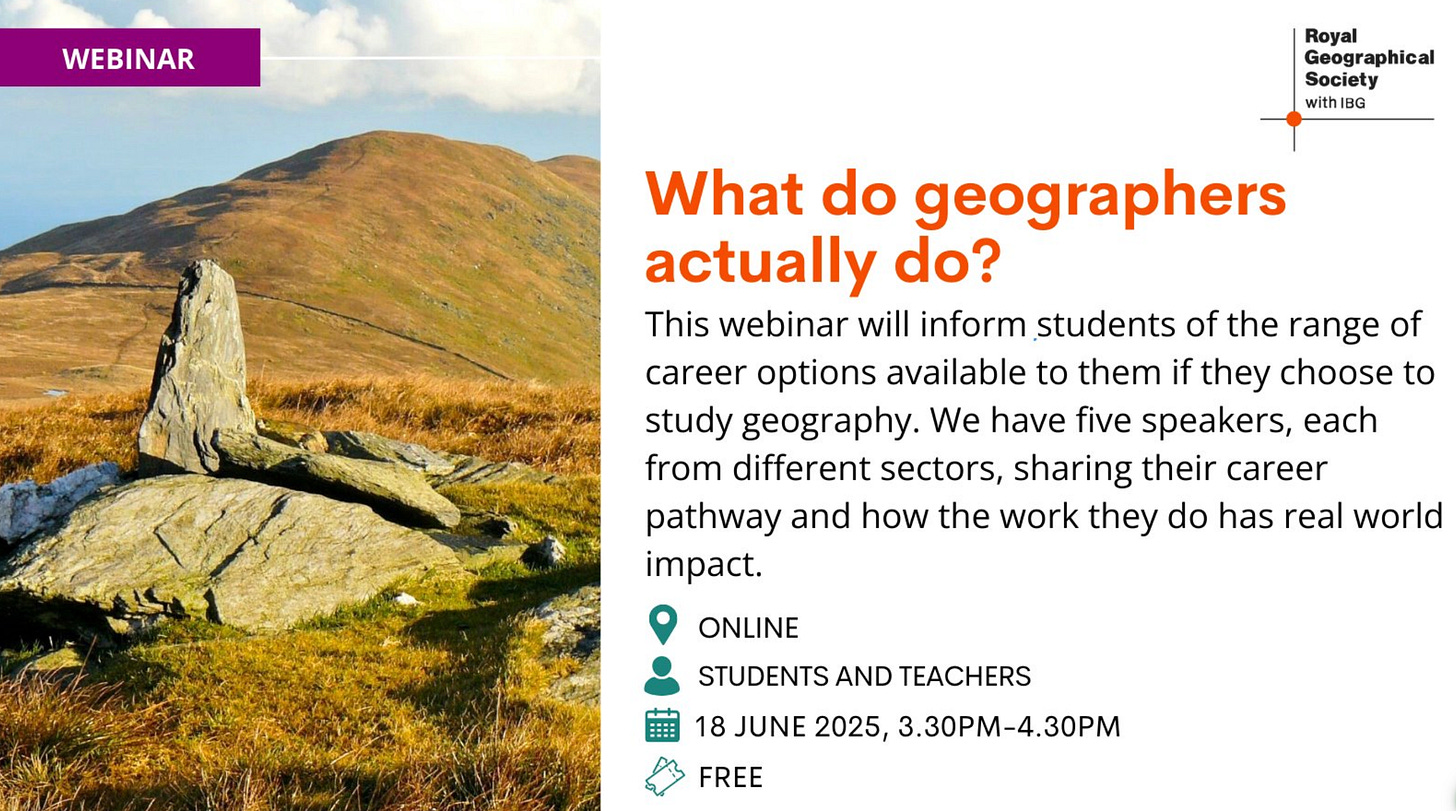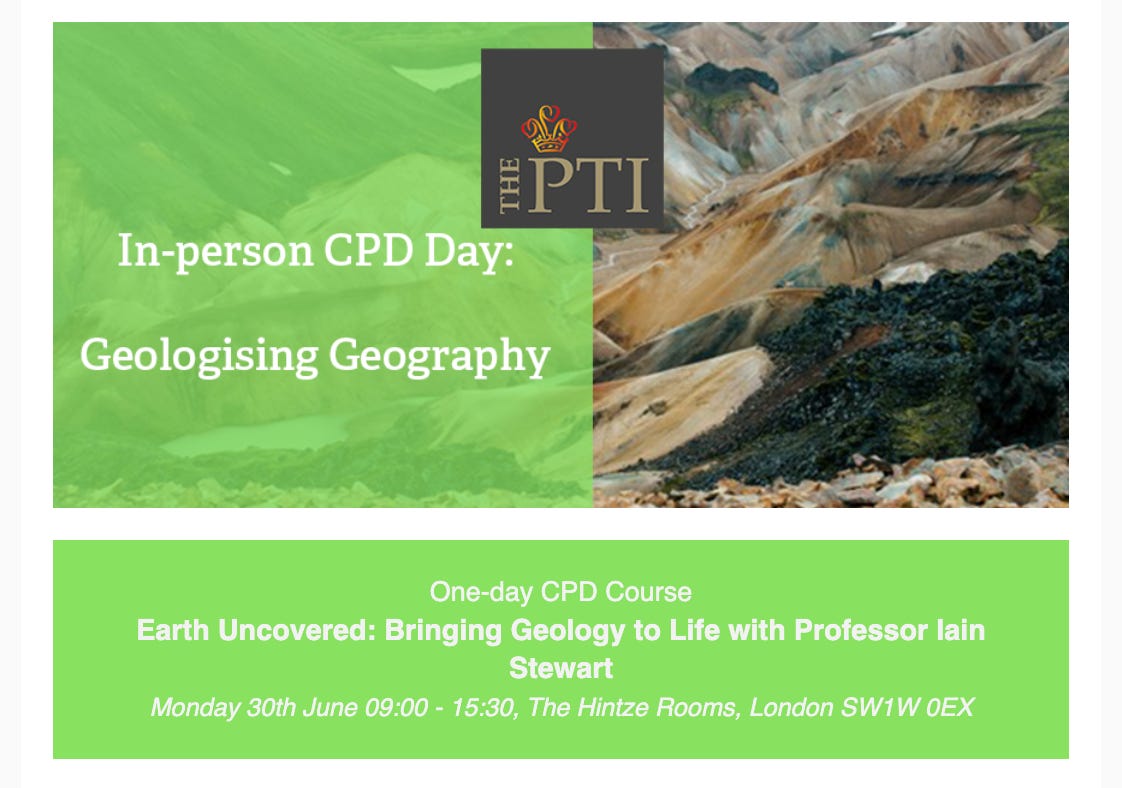Welcome to the twenty first weekly newsletter providing a summary of key posts on the LivingGeography blog.
The newsletter has come of age. Thanks very much for reading. You know the format by now. Each newsletter will usually include a number of sections:
a digest of posts from the LivingGeography blog (and other blogs)
any important geographical news
an update on any personal projects
details of books that I am reading, or cultural experiences
a couple of nice images taken this week
events that you might be interested in
Half of this week has been made up of half term. The first half of the summer term went very quickly and there’s only a quick half term to go before we head into the long (and probably hot) summer. Hoping we don’t get too many lengthy periods of sweltering weather where I have to be in a classroom.
Posts on LivingGeography this week included
An introduction to the Royal Meteorological Society’s Curriculum for Climate Literacy, developed with a number of organisations, including the GA and RGS.
Marking the passing of Sebastião Salgado.
Something on the publication of the 2025 Human Development Report, which has a focus on the potential of AI to improve development.
A Guardian article on the growing threats of unbearable temperatures in Indian cities. Temperatures are a particular problem for the poorest in the population. High (and low) temperatures appear in something called the Misery Index. This can be viewed in the Earth Null School viewer of Cameron Beccario.
A video on the impact of cruise ships on Stavanger.
Also added something to my GA Presidents’ blog on the work of Laurence Dudley Stamp (GA President in 1950) and his influence. See the Images section for the inspiration for this post, and thanks to George Tobin for sharing his PhD research.
Stamp was RGS President in the year of my birth, and was also President of the IBG.
News
Last week I attended the launch of some new resources: a refresh of the Discovering the Arctic website. It was a lovely event, organised by Simon Pinfield. The resources are excellent, and it was excellent to see a selection of artefacts from the collections of the RGS, and chat to people involved in the Arctic Council.
The project has involved a number of partners, who are shown below.
Check out this section for example on how to define the Arctic.
I started half term by heading to Cinema City in Norwich to see the latest film from auteur Wes Anderson. It was filmed in his usual style: precise symmetrical framing, intricately detailed sets and typography and idiosyncratic performances from a large ensemble cast. I particularly liked Michael Cera’s bug-addicted Bjorn. Check it out, although if you’ve never seen a Wes Anderson film, watch ‘The Grand Budapest Hotel’ or ‘Fantastic Mr. Fox’ first.
Check out my Geography in/on Film blog if you haven’t previously visited it. There are over 400 posts on various geographical connections with cinena, and plenty of films I have seen.
Projects
As with last week, it was Oak reviewing and writing for the international project that kept me occupied in my spare time. Plenty of reading and research involved in the latter.
Books
I continued to dip into Barry Smith’s ‘The Island’ as I put together the support materials for the Young Geographer of the Year award. I speeded through Roz Morris’s ‘Not Quite Lost’ too.
Images
A couple of images from my visit to the RGS last week.
The Tea Room at the Royal Geographical Society - accessible by Fellows and Members. Food also available at certain times, including a rather nice vegetable soup.
Vertical view of one of Dudley Stamp’s 3D relief models on display at the Royal Geographical Society - a desert landscape
Images by Alan Parkinson, shared on Flickr under CC license
Events
Time is running out to book to join me at the Festival of Geography in less than a month’s time. It’s going to be a good day, and will be followed by the Earth Photo Awards.
Sir Jonathon Porritt is speaking at Norwich School later this week in an event for the RGS Eastern region. I shall be there, and hope to see some of you there perhaps - come and say hello!
Details here. Booking needed please.
Jonathon’s view is that we now face an inflection point, ecologically, politically and economically, with some very turbulent times ahead.
The current focus of his work is on intergenerational justice, supporting young people in their activities addressing the twin crises of the climate and biodiversity emergencies.
Jonathon is President of The Conservation Volunteers and Population Matters, and is involved in the work of many other NGOs and groups. Jonathon was formerly Co-Chair of the Green Party (1980-1983) and Director of Friends of the Earth (1984-1990). Jonathon was awarded a CBE in January 2000 for services to environmental protection.
Free for RGS members, £5 for non-members.
Here’s a question for you: What do geographers do? - find out on the 18th of June in an online webinar.
An online session - details are here.
Employers love geographers, but what is it that geographers actually do? This free event aims to support students, teachers and parents to understand what careers are available for those that choose to study geography. Our speakers will share their own individual education and career pathway, and the ways in which geography has equipped them with a wealth of skills and knowledge relevant to their jobs today. They will discuss how they use geography in their work, and how this geography has led to real-world impact.
Speaker programme
Anup Patel – Performance Director at Seven
Alexandra Swinkels – Director of Project Design and Resource Mobilization at Vanguard Economics
Grace Milner - Geospatial Analyst at Ecometric
Sarah Beasley – Deputy Head of the SDGs Data Website Development at the Office for National Statistics
Andrew Robinson – Environmental Consultant at Greengage Environmental Ltd
The PTI have an excellent looking course on the 30th of June for those interested in geology.
Make Geology engaging with practical strategies and new inspiration
This CPD day will give Geography and Science teachers essential knowledge of geological processes, offering engaging and cost-effective ways to integrate Geology into lessons. Learn how to establish Geology clubs, explore fieldwork opportunities, and incorporate GCSE and AS geology into your curriculum to inspire the next generation of Earth scientists.
This course is perfect for those who:
Teach KS3, 4 or 5 Geography.
Are looking to expand geographical knowledge to meet KS3 National Curriculum requirements.
Teach Geography or Science and want to enhance student learning with a Geology club, ideas and resources.
Speakers include Professor Iain Stewart from the University of Plymouth. Iain has worked with BBC Science for 15 years making documentaries about the planet and is perhaps best known for the geography series Earth: The Power of the Planet. He is currently President of the Royal Scottish Geographical Society and the Devon Wildlife Trust, and was formerly president of the Earth Science Teachers Association and honorary president of the Geographical Association.
This course will be led by the legend: John Wilkinson. John is the Head of Geography at St Edwards College, Liverpool. John started his career tutoring at Lochranza field Centre on the Isle of Arran, progressing to Head of Geography and Senior Tutor teaching Geography and Geology across all Key Stages.
Also check out this RGS ‘A’ level Workshop. It looks excellent.
This one-day workshop is designed to introduce A Level teachers to new ways of explaining changing places with a particular focus on connections between people, the economy, and the ways that infrastructure(s) link the local, national, and international scales.
Led by academics based at the Bartlett Centre for Advanced Spatial Analysis (CASA) at University College London, we will explore topics including:
How you can understand neighbourhoods and cities as complex systems (which gives you new ways to think about economic change and social inequality).
How you can use fieldwork to ground these ideas in practical questions of past and present connections, and shifts in the flows of people, resources, money and investment.
How you can put these two strands together to create simple simulations of residential gentrification and discrimination, and how simulations of urban phenomena can be used to generate hypotheses about how cities work.
We will be based at UCL's new Stratford campus in Queen Elizabeth Olympic Park. On the day, you will be taken on a guided tour of the Park and nearby neighbourhoods including Stratford and Hackney Wick, exploring the history of the area and how and why it has changed over the past 150 years.
If I lived closer I would definitely be going along to this. It’s just too convoluted (and expensive) to get there in time unfortunately.
If you’re a KS2 or KS3 teacher and want to know more about Digimap for Schools, Darren Bailey is running a webinar which is FREE but advance booking is required on the 17th of June.
As always, please share the existence of this newsletter with colleagues and others. If there’s an event or job vacancy you want me to publicise, please get in touch…


















